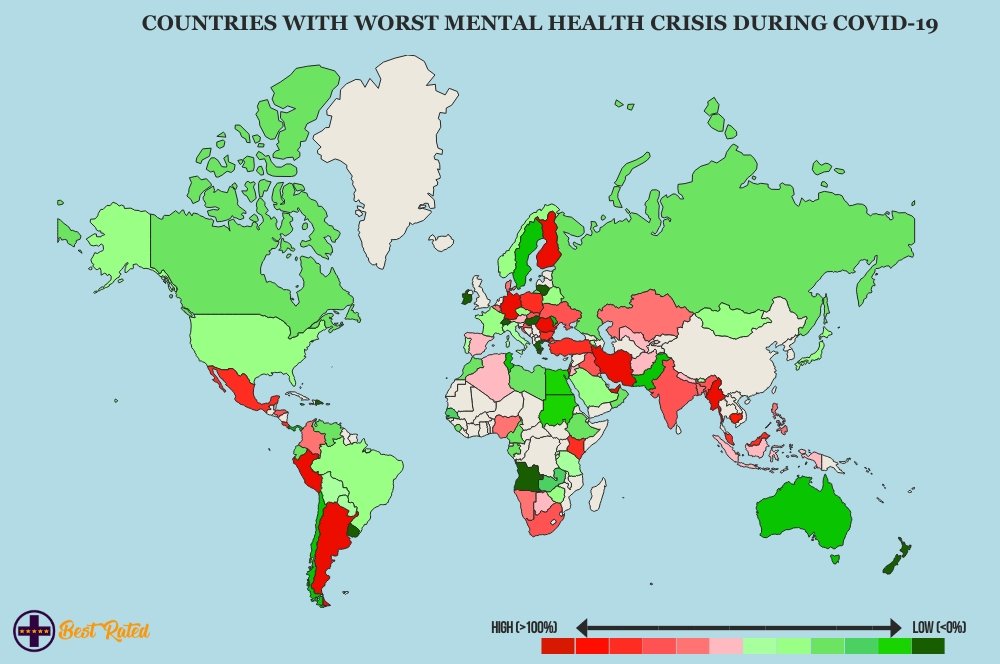INTRODUCTION
The Covid-19 pandemic is having many life-altering short term and long term effects. As the world went into complete lockdown and self-quarantine has become the new norm, the isolation and the lack of social interaction must have had a profound effect on one’s mental health. Covid-19 has caused a lot of stress as there is so much unknown about the virus itself, but the long term impact of the pandemic hasn’t been truly understood. Understanding the impact the pandemic on an individual’s mental health and the correlation between the number of active cases and a person’s mental health is very crucial in order to tackle the crisis.
RESEARCH METHODOLOGY
To understand the mental health crisis as compared to last year, one of the very crucial means would be to study the search terms that people have been seeking information on using Google. Comparing data from 2019 to this year would help understand the percent change. This data can be collected by utilising Google Trends that analyses the popularity of top search queries on Google.com across various regions and languages.
To accurately understand the mental health situation in each country, one should analyse and compare the popularity of the search terms related to mental health from September 2019 to September 2020. The variables impacting and perpetuating the mental health crisis mostly remain constant in the span of the year, the glaring difference between the years is the pandemic that has swept the world. Any change in the number of searches can be attributed solely as a by-product of the pandemic. Along with Google trends, a secondary research was also conducted on some popular mental health services to understand the increase in their usage.
HYPOTHESIS
The data would most likely showcase a trend where the number of searches related to mental health would increase as the pandemic has resulted in economic instability, increased work related stress, family problems, loneliness, etc.
RESEARCH RESULTS
Analysing the Google searches of individuals from different countries has produced some shocking results. The term “mental health” was studied diligently via Google Trends. On average, the number of overall searches for the term has increased by more than 50% compared from last year. When data from September 2019 and September 2020 was compared, the percentage change was influenced highly by the number of active cases in that particular country.
Below table shows the top 10 countries with worst mental state during covid-19 as compared to the same period in previous year.
| # | Country | Sep-2019 | Sep-2020 | Increase (%) |
|---|---|---|---|---|
| 1 | UAE | 20 | 55 | 175% |
| 2 | Peru | 19 | 46 | 142% |
| 3 | Romania | 20 | 46 | 130% |
| 4 | Myanmar | 29 | 56 | 93% |
| 5 | Germany | 31 | 58 | 87% |
| 6 | Finland | 42 | 78 | 85% |
| 7 | Iran | 20 | 37 | 85% |
| 8 | Argentina | 39 | 71 | 82% |
| 9 | Israel | 16 | 29 | 81% |
| 10 | Costa Rica | 37 | 67 | 81% |
When studying data from countries that are still dealing with the pandemic, the search for the term “mental health” was significantly higher from last September. This is because citizens of that country are still actively impacted because of the proximal factors like economic crises, job instability, family crises, etc.
Below table shows the top 10 countries with better mental state during covid-19 as compared to the same period in previous year.
| # | Country | Sep-2019 | Sep-2020 | Increase (%) |
|---|---|---|---|---|
| 1 | Lithuania | 34 | 20 | -41% |
| 2 | Greece | 24 | 18 | -25% |
| 3 | Angola | 48 | 38 | -21% |
| 4 | New Zealand | 51 | 40 | -21% |
| 5 | Uruguay | 36 | 31 | -13% |
| 6 | Dominican Republic | 30 | 26 | -13% |
| 7 | Switzerland | 39 | 34 | -12% |
| 8 | Hungary | 58 | 52 | -10% |
| 9 | Ireland | 39 | 35 | -10% |
| 10 | Moldova | 44 | 41 | -7% |
Countries that have reopened and have officially “beat” Covid-19 like New Zealand, Uruguay and Lithuania noticed a decline in the Google searches as early as June 2020. The governments of these countries also focused on providing its citizens additional welfare in order to reduce the addition stress that could be caused because of job instability and economic crisis.
The mental health crisis has particularly impacted developing and underdeveloped countries. The searches in these countries have always increased irrespective of the number of active Covid-19 cases. There is a dire need for mental health resources in such countries, hence the number of searches is high. Developed countries like Canada, Australia, etc. despite the rising number of cases the search of mental health resources isn’t as high as it in developing countries as there is already a pre-existing mental health support system.
The pandemic has led to the development of many mental health support mobile apps and websites like www.talkspace.com, www.wysa.io, iwill.epsyclinic.com , www.ventallout.com, etc. This pandemic has seen a drastic rise in the number of users of these applications. According to app market intelligence firm Sensor Tower, first-time downloads of the top 20 mental wellness apps in the U.S hit 4 million in April.
Talkspace experienced a spike of 60% since April 2020. Wysa, a Bengaluru-based mental health and wellness app, saw a sharp spike in the number of people using the anxiety and isolation support tool packs that the platform offers. 30,000 such packs were utilised on an everyday basis, which has now surged to around 100,000.
VentAllOut, a platform for people to express their emotions anonymously has seen a 20% traffic increase during the pandemic. IWill therapy app by epsyclinic, used to conduct around 300-400 free chat sessions on a daily basis, is now managing 600 sessions every day because of the pandemic. Many governments all over the world have started helplines to deal with these additional cases. The increase in mental health resources showcases the depth of the current crises.
The Covid-19 pandemic has resulted in an increase in the number of cases of anxiety, depression, PTSD, etc. People all around the globe have faced difficulties that have resulted in deteriorating mental health, the increase in the searches for resources and helplines show that this crisis is not concluding any time soon.



